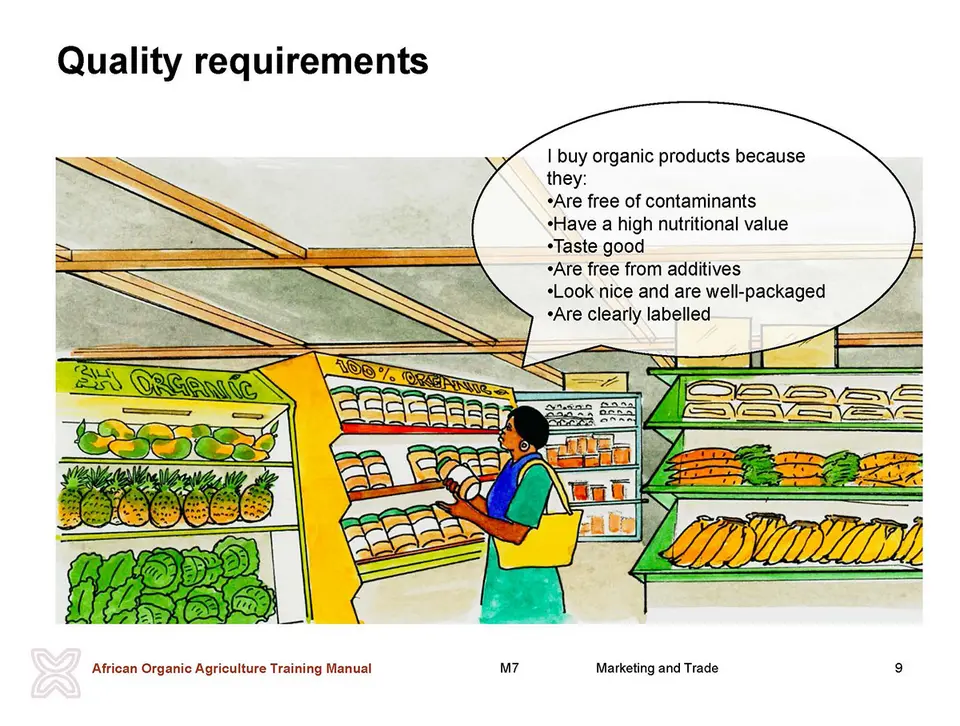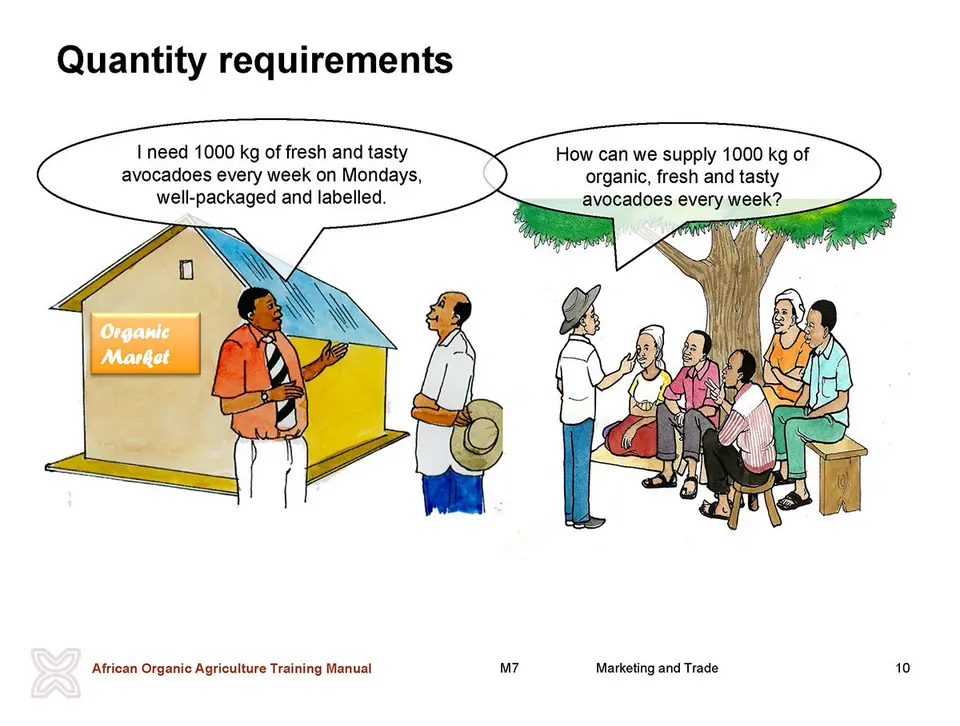What are the requirements to market organic products?
Different markets have different requirements regarding the quality, certification and documentation of organic products. Therefore, in the process of planning an organic business and corresponding marketing activities, producers need to decide for which market they would like to produce. Part of this query relates to find out which regulations are relevant for what countries and marketing opportunities.
What quality is required?
Consumers expect a specific quality from specific products. To know the quality expectations and to implement them in the product design and marketing, therefore, are fundamental for the success of an organic business. At the same time, producers have to make sure that they can guarantee this quality along the complete product chain.
Quality refers to multiple aspects that define as the marketability of a given product in terms of:
- Food safety: free of residues and contaminants
- Nutritional value of product, content of vitamins, antioxidants, polyunsaturated fatty acids etc.
- Free from additives and colorants
- Natural taste and smell
- External appearance: colour, healthy looking (free of blemishes, disease)
- Appropriate packaging; presentable and hygienic packaging for consumer markets
- Environmental benefits of a product towards natural resources and climate
- Consistency and continuity of supply
- Communication services such as labelling, informing about this quality
- Organic certification endorsing this quality.
Discussion with invited consumers, processors and traders
Invite two consumers, two processors and two traders to the training and moderate a discussion with them about their quality requirements towards organic products. Discuss with a concrete product relevant for the participants:
- Start with a brainstorming session, listing the requirements on a flip chart or pin wall.
- Group and prioritize the requirements in a next step.
- Let the participants discuss the different requirements and find out where there are difficulties for producers to match with the requirements and how these difficulties could be solved.
How do organic markets differ from other markets?
Company objectives - In addition to economic objectives like increase sales volume and income, aspects of ecological and social responsibility are also considered. This means for example: save and recycling of energy, a minimum fair salary for all employees of a farm or a trading company and a fair share of the benefits to all business partners. These aspects are highly appreciated and increase the credibility for customers.
Transportation restrictions - Food miles and carbon emission in transport become increasingly important in organic trade. This counts for trade within Africa but also exporting to Europe. Some privately controlled organic standards such as Soil Association (UK) and Bio Suisse (Switzerland) do not allow import by air. Transported goods may only be sprayed with pesticides or cleansing agents, which are specially permitted for use with organic products.
Packaging and declaration - Packaging must be free from pesticides, colourings, solvents or cleansing agents, which could contaminate the organic products. Organic products must be labelled in accordance with the regulations laid down by the organic legislation of the country where the products are sold.
Organic legislations and standards - In order to sell organic products on the market and labelling them as organic, producers and traders have to comply with specific regulations. The main goal of organic standards and regulations is to regulate organic production (on the farm), organic processing (food industry) and trade.
- Private standards in organic agriculture were first set up by organic farmers’ associations on a private level, as binding rules of production for their members. The first private organic standards and labels were Demeter (international), Bioland and Naturland (Germany), Bio Suisse (Switzerland), Nature et Progrès (France) and the Soil Association (UK). Several countries in Africa also have developed private standards.
- Since the nineties of the last millennium, more than 60 governments developed and put into force public organic regulations or are on the way to it. On a governmental level, there are organic regulations in the EU, in the USA (NOP), Japan (JAS), Switzerland and many other countries. In Africa, Burundi, Kenya, Rwanda, Tanzania and Uganda developed the East African Organic Production Standards.
- At the international level the Codex Alimentarius Commission (CAC) publishes the ’Guidelines for Production, Processing, Labelling and Marketing of Organically Produced Foods’ on which national governments base their legal regulations. At the international private sector level, the IFOAM Norms include a global organic standard approved by the representative of the organic movement. These standards provide guidance on management principles for the production of agricultural products, handling, storage, processing, packaging and transport of products as well as a list of permitted substances.
- African organic standards and regulations - Egypt, Tunisia, Burundi, Kenya, Rwanda, Tanzania, Uganda, Senegal have governmental organic regulations while South Africa has a private standard (Afrisco Organic Standards), www.afrisco.net
What quantity is required?
African farmers producing for export markets often face the challenge to produce enough quantity. The situation for farmers producing for domestic markets is completely different. Organic markets still are very young and products are not yet established in the market. Consumer awareness is still lacking and not many consumers are willing and able to pay considerable premium prices. In these countries, farmers have to deal with the challenge of producing enough for smaller markets with smaller product volumes and low prices.
A solution to face challenges for domestic and export markets is cooperation between farmers and distributors, who work together to make organic products available and searching for efficient trade routes. A fundamental solution to face the quantitative challenge on export and domestic markets is to combine both, production for export and for domestic markets. Another way of ensuring sales is try to link up with different potential suppliers and buyers. This will help mitigate any problems when demand is fluctuating or when supply is more than demand.
Discussion: Quantity and quality challenges in organic markets
Ask the participants whether they experience any quality or quantity-related challenges in the organic markets they are currently operating in. Form two groups to discuss each of the following topics;
- export market challenges
- domestic market challenges
Discuss the results of both groups in the end and let the participants conclude how domestic and export markets can be improved successfully.
What documentation is required?
Opportunity A – Documentation for export
The EU is the main export market for organic products from Africa. Therefore, the rules on how to export organic products from African countries to Europe are discussed below more in detail compared to the procedures for the U.S. or other markets. Although there are general regulations specific to Europe, it needs to be considered that each export country may have additional requirements, especially if the export products are labelled with private organic label schemes such as ’Bio Suisse’, ‘Naturland’ or ‘Demeter’. The following box provides information on the import documentation, but there is much more to say on this issue to be exhaustive. Further information sources are indicated at the end of this module.
Import authorizations and Certificate of Inspection
For the time being, most products are imported through import authorizations. Import authorizations are requested for imports from all non-EU countries except those listed on the Third Country List (Argentina, Australia, Costa Rica, India, Israel, New Zealand, Switzerland and Tunisia). Applications for import authorizations must be submitted by an importer located in the EU. The importers are often supported by the control body which is certifying the import activities. The vast majority of imports are certified by certification bodies from the EU and very few import authorizations are issued on the basis of a certificate from a non-European certification body. European traders prefer cooperating with European certification bodies with whom they are familiar and who often inspect their EU operations.
The importer has to prove through the application that the products have been controlled under a control system and has production standards equivalent to that of the EU Regulation and has used a control body which meets EU requirements. Within the approved year, the importer may import the products listed from the exporter indicated in the authorization.
In Africa, only Tunisia is listed in the EU Third Countries List, implying that goods imported from these countries do not need an import authorization; they only need to be accompanied by a ’Certificate of Inspection for Import of Products from Organic Production.’ This certificate is issued by the control body of the exporter in the third country. All organic products may be freely traded within the EU. A country may apply to be added to the list of third countries via its diplomatic representatives in Brussels. In order to be added to this list, the country applying must already have enacted an organic farming legislation and a fully implemented system of inspection and monitoring must be in place. The legislation and standards must be equivalent to the EU requirements.
Opportunity B – Documentation for the domestic market
African countries without organic regulation - Still most African countries have no legislation. In these countries, the lack of regulation poses marketing challenges in terms of quality assurance to sell the products as ‘Organic’. However, most producers, processors and traders in such countries are most interested in gaining consumer trust and meeting their expectation for high-quality organic products. They are, therefore, reliant upon a common private set of requirements based on the EU Standards or on the IFOAM Basic Standards. The way of ensuring that organic standards are met include: self-claim, certification through an independent body (e.g. NGO, NOAM or Certification body) and Participatory Guarantee System, in which various stakeholders are involved. Therefore, producing and trading organic products in countries without regulation does not necessarily mean it is an obstacle for domestic trade.
African countries with organic regulation - For the domestic market, African countries with regulation are reliant upon national or regional standards and labels. This is the case for the East African Organic Products Standard (EAOPS) and the associated East African Organic Mark. The EAOPS unites regulations and markets in Burundi, Kenya, Rwanda, Tanzania and Uganda. The ways of ensuring that organic standards are met include: Third-party certification and Participatory Guarantee Systems. The East African organic mark is available to all producers who conform to the EAOPS.
| African countries with governmental organic regulation | African countries with private organic standards |
|---|---|
| Egypt, Tunisia, Burundi, Kenya, Rwanda, Tanzania, Uganda, Senegal | South Africa (Afrisco Organic Standards) http://www.afrisco.net/ |


 tap and then scroll down to the Add to Home Screen command.
tap and then scroll down to the Add to Home Screen command.